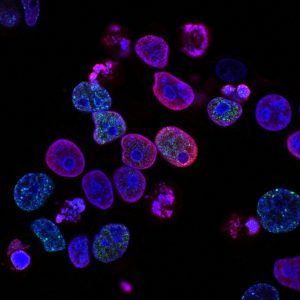A global team of researchers have put their heads together to determine how high-grade gliomas respond to treatment. Discovering this could explain how the cancer cells to hide from the body’s defences and treatment.
About the study 
The research team found that, when treated, high-grade gliomas will recruit help from nearby healthy tissue to help them to adapt. Gliomas appear to remodel their environment in the brain by creating interactions with nearby neurons and immune cells. This helps protect and hide the tumour cells from the body’s defences and any treatment.
The researchers also discovered that low-grade tumours tend to develop mutations that allow the cancer cells to divide at an increased rate, sometimes resulting in the tumour growing to that of a higher grade.
Dr Lucy Stead of the University of Leeds’ School of Medicine had this to say about the findings:
“Learning from patient tissue is the best way to cure the patient disease. This study, which required a global effort to acquire enough glioma samples to adequately power it, has allowed us to gain unprecedented insight into how these deadly tumours progress, and ways that we might finally be able to stop them.”
What’s next?
This study has allowed researchers to analyse data from a large cohort of patients, helping us to understand how standard care can create adaptive change in tumour cells.
Dr Varn, one of the studies’ lead researchers, had this to say in regards to the future of Glioma care:
“This study has made it clear that not every tumour changes in the same way. Knowing this is going to allow us to develop therapies that are better tailored towards each patient’s disease in the future.”
Want to receive all the latest research straight to your inbox?
Sign-up our curated, jargon-free weekly research newsletter. Click here to fill out our contact form and select ‘research’ to opt into our research newsletter.
Get involved with research…
If you would like to use your experience and insight to support clinical research, consider signing up to be a PRIME advocate for brainstrust.
If you or someone you love is living with a brain tumour and have any questions around this latest news, or want to access support, give us a call on 01983 292 405 or email hello@brainstrust.org.uk. You can also visit our little brainstrust website which features support for children affected by brain tumour.









